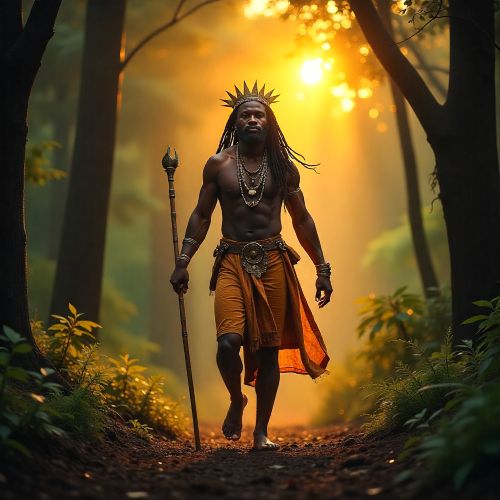Beti-Pahuin Mythology
Beti-Pahuin mythology forms the spiritual foundation of one of Central Africa’s most influential cultural groups. The Beti-Pahuin peoples — comprising subgroups such as the Ewondo, Fang, Bulu, and Beti — inhabit vast regions of Cameroon, Equatorial Guinea, and Gabon. Their mythology, transmitted through generations of oral tradition, reflects a profound philosophy of life, balance, and moral integrity. Deeply intertwined with nature, ancestor veneration, and community ethics, Beti-Pahuin mythology offers a cosmological vision where all beings — human, animal, and spiritual — exist in sacred interdependence.
At the heart of Beti-Pahuin mythology lies the supreme creator god Zamba (or Nzame), the source of all life and order. Zamba is a triune being, often understood in three aspects: Nzame, the creator and sustainer; Mebere, the force of strength and authority; and Nkwa, the principle of beauty and harmony. Together, they govern the universe and maintain cosmic balance. In the beginning, Zamba created the world and the first man, Fam, bestowing upon him life, reason, and stewardship over creation. Yet, according to one of the central Beti myths, Fam misused his power, became corrupt, and defied divine law. Disappointed, Zamba withdrew his favor, allowing Fam’s descendants — humanity — to experience suffering and mortality as a consequence of pride. This story, both moral and cosmological, explains not only human imperfection but also the need for humility, respect, and communal harmony in Beti-Pahuin life.
In addition to the supreme god, the Beti-Pahuin recognize a world animated by ancestral spirits and natural forces. The ancestors, known as mvet or bikulu, play an essential role in guiding and protecting the living. Their approval ensures health and prosperity, while neglect invites illness or misfortune. Rituals honoring the ancestors — including offerings, songs, and libations — are acts of spiritual reciprocity that sustain balance between the visible and invisible realms. The Beti-Pahuin also revere spirits inhabiting forests, rivers, and animals. These beings are not distant divinities but immediate presences, reminding the people that moral and ecological harmony are inseparable.
The mvet epic tradition, central to Beti-Pahuin mythology, is one of the richest oral literatures in Africa. Performed by poet-singers who accompany themselves on the mvet harp, these epic tales recount the deeds of heroes, ancestral founders, and cosmic battles between good and evil. The mvet serves not only as entertainment but as a moral and philosophical guide, teaching courage, generosity, and wisdom. Through these performances, the mythic past remains alive in the present — a dialogue between generations and between the human and divine.
Beti-Pahuin mythology is ultimately a philosophy of balance and accountability. It teaches that divine order mirrors human behavior: when people act with integrity, the world flourishes; when they abandon moral law, chaos and decay follow. Even today, Beti-Pahuin spiritual thought continues to shape community rituals, social ethics, and artistic expression across Central Africa. Through the voice of the mvet, the prayers to Zamba, and the enduring respect for the ancestors, the Beti-Pahuin people preserve one of Africa’s most profound mythological systems — a vision of the world where every action resonates in the sacred harmony of creation.


